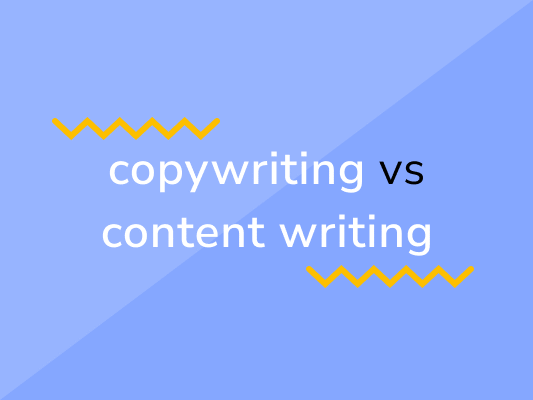Do you need a copywriter or a content writer? What are the differences between the two? Read on to find out which writer is best for your business.
Copywriting and content writing – are they the same? Many marketers and businesses can get pretty confused between the two.
Yes, they might both involve writing and share a great many similarities with a writer wearing both caps of responsibilities.
However, the two fundamentally refer to two different types of writing, and understanding both will definitely be helpful especially when you are looking to hire the right writing position.
So without further ado, let’s get started. What is copywriting and content writing, and which is the best for you?
What is Copywriting?

Copywriting is essentially writing to sell. Be it an idea, brand, or product. Copywriting would be more advertorial in nature as it intends to pitch customers to use your brand’s product or services.
In other words, it is sales-driven.
A copy can most often be found in advertisements like those GiF banners that you see on websites or a sales landing page you get directed to from clicking on a Facebook advertorial post.
Or it can simply be physical in prints like those brand marketing messages on flyers or the advertisement board telling you how easy it is to just order food online.
Due to limited space or time to grab the reader’s attention, a copy is usually kept as short and impactful as it can.
What is Content Writing?

Content writing, on the other hand, is what you are reading right now. This blog post right here is a piece of content.
Content writing either informs, educates, or entertains and is drifted more towards content marketing to target searcher’s intent and to hopefully have a high rank in the SERPs.
Content writers create articles, blog posts, and even eBooks with an SEO content strategy in mind. The content writer focuses on relevant keywords and creates content based on the keywords.
Content writing is engagement-driven and is designed to answer the reader’s questions, often even before they know to ask it.
Copy & Content Writing: Similarities
Though it may seem through the definition that both copywriting and content writing are crafted for different scenarios of writings, both share the same aim to convert a reader into a sale or a lead.
Both need to be engaging and written well in order to market products and services.
Despite that, what is well-written for one may be different than the other, next we will look into the greatest distinction between these two that lies in their purpose, strategies, outcomes, and values.
Copywriting vs. Content Writing: 9 Key Differences
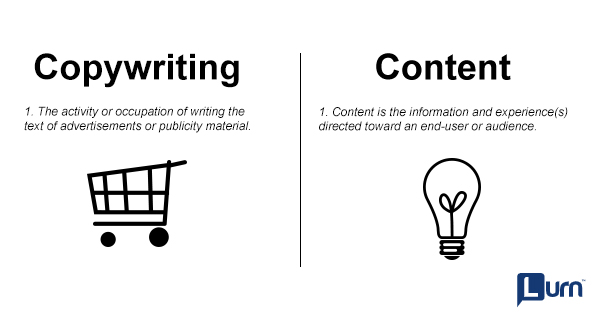
Knowing the difference between these two is very important if you plan to outsource your marketing or hire a freelancer to create the right type of copy or content for your target personas to achieve impact.
1. Intention
Copywriting aims to convert leads into sales while content writing is crafted with the intention to drive organic traffic to your website.
According to Techclient, websites with blogs have a 434% better chance of being well-ranked on search engines like Google, as compared to those without a blog or content marketing strategy.
So as important as copywriters create marketing copy and sales landing page with the intention of convincing customers to purchase.
Content writers create blog posts or articles to inform and educate, as well as to build a relationship with the readers.
Your content marketing when done right should also drive inbound traffic, attracting the right audience and leading them down a sales funnel which eventually will help you close your sales.
To help you target the right audiences, you can choose to use our BiQ’s Keyword Intelligence to conduct your keyword research.
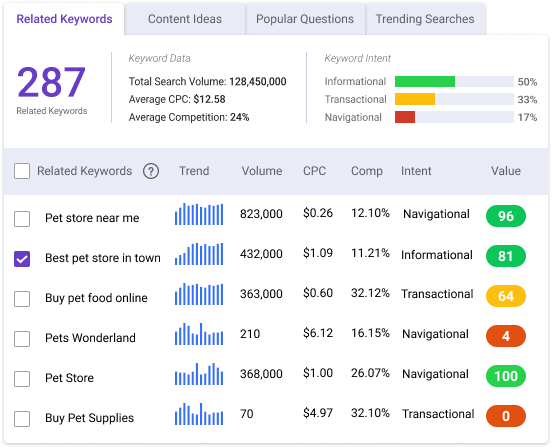
It will provide you with the exact search queries your audiences are looking for and the important keyword data like search volume and intent to help guide your content writing.
This will help you to choose topics based on the main keywords and search intents that align with your business goals.
2. Strategy
A copy would usually aim for instant results while content is more of a long-term strategy.
Copywriters are looking for sales and they often craft to evoke feelings and emotions that will drive customers to purchase.
This is often paired with a sense of urgency and social proof to convince their audiences to take immediate action just like this countdown below.

On the other hand, content writers aim to build an engaged audience. They want to write to build trust and authority within the readers.
If done right, your brand is the first thing that they will think of when they are ready to buy.
The content will be designed to inform and help the readers, which in turn will promote brand loyalty and convert audiences to become potential leads.
3. Length
Copywriting is not bound by length but content writing has a minimum word count to reach.
When you look at the types of writing for copywriting and content writing, often you will see that copywriting materials are short-form while content writing is most usually longer pieces of content.
Especially when it comes to writing blog posts. Based on a Hubspot study, the best practice for a piece of content to rank high on the search page is to at least have a minimum of 2,500 words.
Copywriting is usually on smaller mediums like billboards or postcards, hence it is important to keep it short and effective.
4. Purpose
Copy delivers experience and content provides information.
Though both copywriting and content writing are writing catered to your target audience, they are both created for different purposes.
Copywriting writes to flex their persuasive writing muscle and focus on delivering customers an experience on how their buying their service or product can change their life.
Whereas content writing aims to create valuable content that will help audiences understand your brand and generate interest, leading customers to sign up for your emails and learn more.
5. Time
Copywriting follows a deadline and content writing follows a content calendar.
Copywriting is usually given projects that have to be completed before a deadline. Copywriters follow a more “on-demand” schedule due to the aggressive marketing nature.
They need to work following the market demand.

Content writing needs more long-term planning as the process of content writing is quite long where there is a lot of keyword research, search intent matching, as well as editing and optimizing.
That’s why for content marketing, it is essential that they work according to a content calendar and schedule the publishing times according to topics.
6. Process
Copywriting works with existing information while content writing involves research.
Copywriters are salespeople at heart who use words to motivate and create excitement. Since most copies are kept short to be impactful, no further research is needed.
They tend to work with what they have, or that is provided by clients and start applying their techniques to drive readers to the next stage of buying.
Content writers write for both search engines and readers.
They need to write to inform and educate the readers about your brand. Most importantly, they need to do keyword research and research on the search intent in order to rank in a high position on the search engine page.
Hence, content writing is usually 70% research and 30% writing.
7. Style

Copywriting emphasizes creativity while content writing is informational.
Content writing and copywriting have two very different styles which require a different set of tricks, skillsets, and training.
Besides, when it comes to terms of style, both have different mindsets and ways of approaching a problem.
With the limited length, space, and time to catch readers’ attention, it is why a copywriter needs to be extremely creative to create a really good copy.
Creativity is the only way to create a good piece of copy that is not only persuasive but emotive.
On the other hand, content writing is all about creating relevant pieces of content that answer user queries.
Again, the idea is that you want your content to rank for your target audience’s queries while they are looking for something on Google.
Higher ranking content will also drip to your website domain ranking and you will show up as a topical leader in your niche or industry which will help you build customer’s trust.
Because of this rationale or concept, that is why content writing needs to be informative, detailed, and educative. The readers want to be able to gain something, and what’s better than some free information?
8. Brand of Voice
Copywriting speaks the voice of your brand while content writing is conversational.
You’re probably already familiar with the “Just Do It” slogan and how it is associated with Nike. Or maybe you hear the “It’s Finger-Lickin’ Good” slogan and you will naturally think of Colonel Sanders and KFC.
This is what a copy is. It aims to associate the brand name with the brand voice in order to engrave the brand into the consumer’s mind.
Besides, a copy also needs to match other visuals of the brand like color theme, font, and logo. Take this Netflix ad for example:
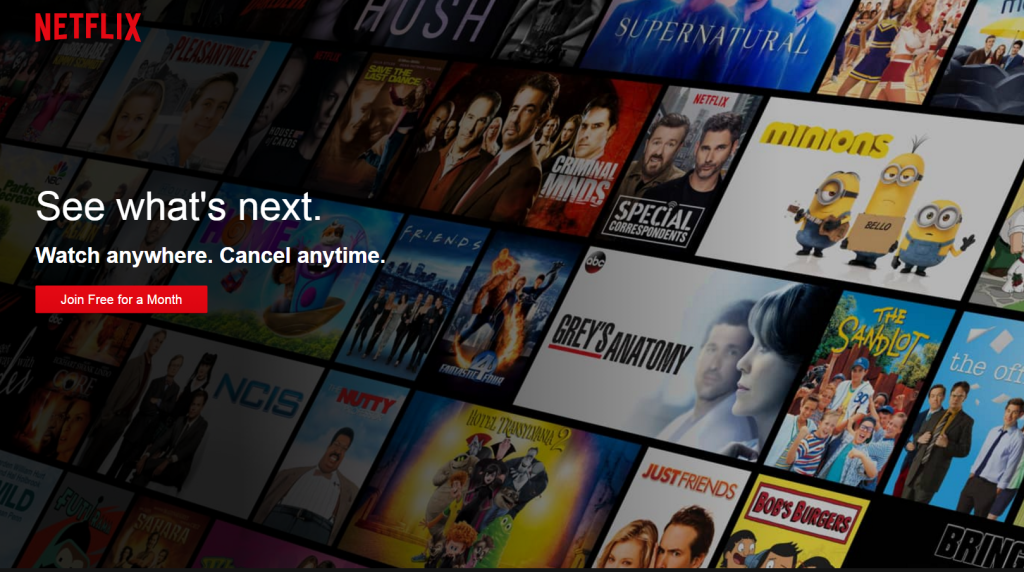
Its brand color is always red and black and white. That specific font is also important for the brand.
Unlike copywriting, content writing does not need to maintain a brand voice. The main purpose is to create a piece of content that is trustworthy and credible which will warm up the readers to the brand.
Some content writers tend to be more conversational and casual with their writing. This will make it easier and friendlier to convey ideas, information, etc to the readers.
9. Examples
Now to further help you understand the differences between these two, here are some quick examples:
Example of copywriting
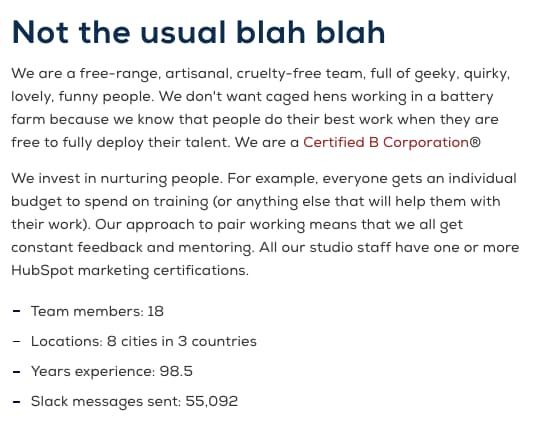
The short copy here is catchy and stands out as it communicates the benefit of Trident immediately, Instead of the usual minty fresh breath copy that so many other gums offer, it clearly distinguishes itself from other brands.
Example of content writing
You can find many examples of content writing at our BiQ blog right here.

As you can see, content writing is more focused on teaching and educating your audiences.
However, at the same time, you can also try associating it with your own brand or product and show how you can help with their issues.
Do you need copywriting or content writing?
All in all, it depends on your business goals.
You would want to hire a content writer if you want to attract more organic traffic to your site through high-quality and keyword-optimized content.
If your company also spends a lot of time educating and informing your prospects to your customers before any sale, then the best strategy for you is to hire a content writer who can do it efficiently.
They don’t necessarily know how to write for conversions like copywriters.
However, great content will help you to drive social shares and keep your readers coming back for more. And in the long run and potentially turn them into a customer!
If your company sets up a website and plans to build a web presence to motivate people to click on a button and buy, what you need is a good copywriter. You would ideally hire a copywriter that can learn and understand your product or service.
Most importantly, the person needs to be able to know how to persuade and motivate someone to make an informed decision.
While most copywriters and content writers can adapt to both writings, it’s best that you get to know and do your research well in order to find a writer that aligns with your brand.
In the end, this is your business and ultimately you most probably want to make a good impression on your readers whilst getting sales.
What makes a good copywriter or content writer?

Skills. Both types of writers have their own specific set of skills and techniques.
A good copywriter must be able to have the ability to attract, engage and convert leads with words. They also need to have polished writing skills, mastering grammar, punctuation, and spelling.
Copywriting is so much more than just putting words on the screen, it is also about the awareness of user experience. Focus on the keywords and make them make sense to the user and the brand. Making a good and clean design of the copy is also essential.
A good content writer needs to be able to write clear, informative, and engaging content for the readers. Most importantly, they need to be able to know all about SEO strategies, especially on keyword research and content optimization.
This is all to help your content rank high in the SERPs and directly get more organic traffic and visits, hence converting a reader to a loyal customer.
Both writing, need SEO
Differences aside, no matter if you are doing content writing or copywriting for the internet, you have to make sure they are optimized! For that, you can use an SEO tool like BiQ.
Specifically, you can start by using BiQ’s Keyword Intelligence tool to do your keyword research before writing.
A quick tip is that, if you are a website that is just starting to write about the topic, we recommend that you start by targeting long-tail keywords.
Long-tail queries are search terms that consist of 3 or more words and has lesser competition and is able to pinpoint the users’ search intent well.
Using BiQ you can use the filter to discover only long-tail keywords with informational intent for your content writing.
Meanwhile, for copywriters, likewise you can filter for long-tail keywords with transactional search intent instead.
Just click enter and you will see a list of profitable long-tail keywords that are waiting to be explored. These are the buyer keywords that you should focus on inserting into your money pages.
Besides that, as an added step for content writers, you can also make sure your content is optimized by using BiQ’s Content Intelligence tool!
Simply enter the URL of your content together with your target keyword in the Content Intelligence’s search box.
From the results returned, you will get an overview of how your content is actually performing, in the eyes of both humans and search engines.
The tool will help you analyze your content section by section, showing you both a sentiment analysis as well as your Word Vector score to see how you are doing against the Top 10 ranking results for your keyword.
If you are not sure where to start, you can begin from the alerts in red or the ‘Important’ section because it represents critical errors that you must fix immediately.
We recommend that you do not publish content that has red lists as they might not attract traffic.
As for the “alerts” tab seen in yellow, it indicates that you should spend some time optimizing it to enjoy an evident result moving forward.
If your content manages to achieve the green state then congratulations, it represents a job well done!
Conclusion
The bottom line is both content writing and copywriting have their differences and it is indeed significant. Content informs, with the goal of selling later. Copy sells, driving action while being memorable.
All things considered, look at your business goals and decide. Ultimately, having the right mixture of both might be able to deliver your brand to success!



